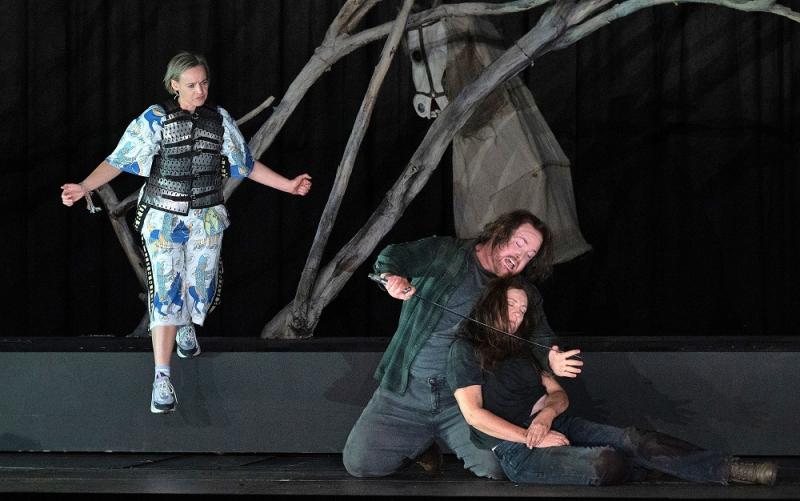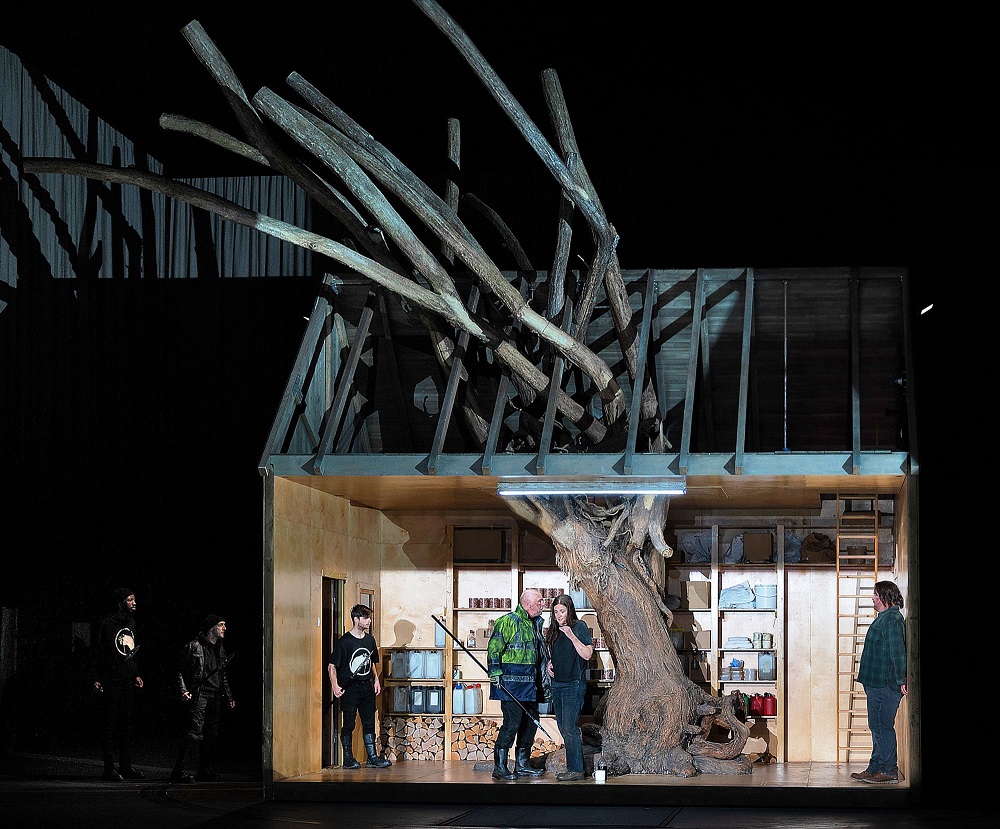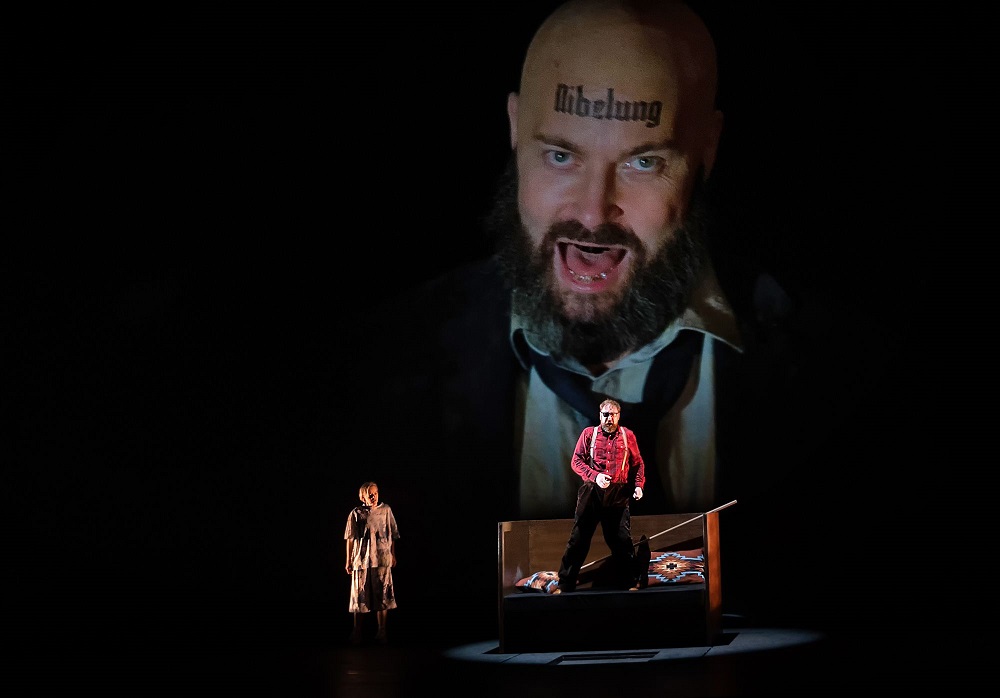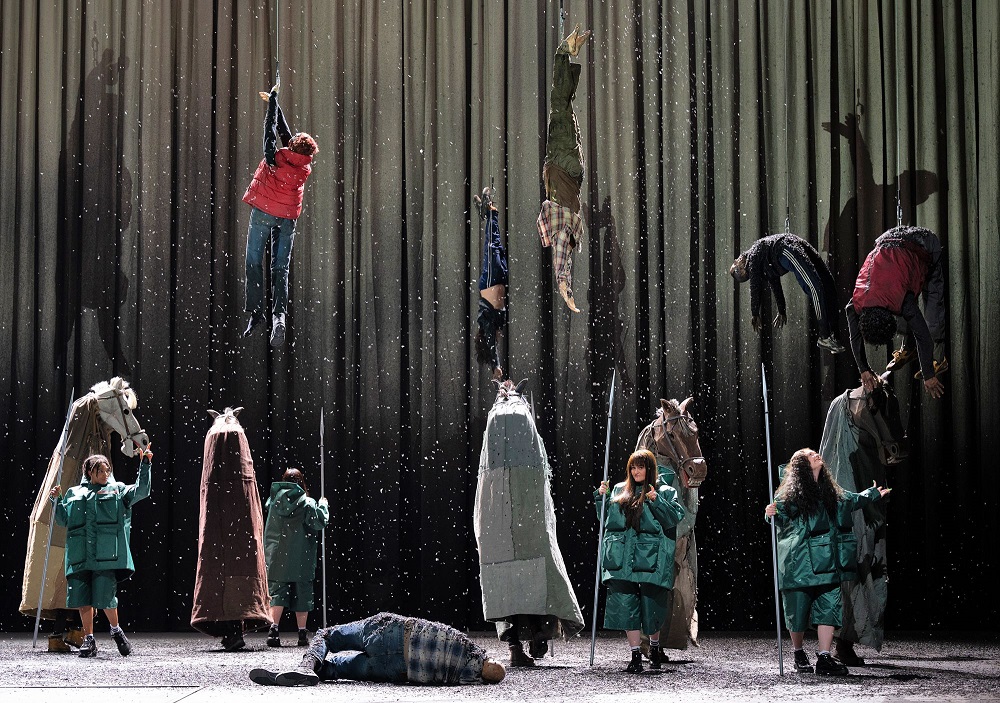The Valkyrie, English National Opera review - fitfully flickering flames | reviews, news & interviews
The Valkyrie, English National Opera review - fitfully flickering flames
The Valkyrie, English National Opera review - fitfully flickering flames
Consistently fine orchestra, singing from strong to strenuous, clear but patchy staging

That the ever-decreasing circles of Richard Jones’s first Wagner Ring instalment for English National Opera ended in a no-show for the fire that should have made former Valkyrie supreme Brünnhilde proof against all but a fearless hero – Westminster City Council poured cold water on it before this first night – is in a way the least of it.
An act which has begun so searingly with a first-rate septet of warrior maidens and blazing orchestra under an ever-masterly Martyn Brabbins fizzles into some very choppy singing for the father-daughter confrontation which should make for one of the most moving endings in all opera. There wasn’t much going on here dramatically, either, puzzling from a director who has so many good ideas, executed with varying degrees of success, in the first two acts.
This is Jones’s third Valkyrie in his second-and-a-half Ring cycle – he got no further in a planned Scottish Opera tetralogy – and maybe it’s significant that I can’t remember much about his Royal Opera staging compared to the searing insights of the Rheingold, Siegfried and Götterdämmerung there. Mark Three begins in vintage style with a log cabin of a far-north pioneer, blasted tree rooted as required below the floor of the main room, and Sieglinde incantating the rescuer who will turn out to be her brother Siegmund up from the flaming hearth. It will be contrasted with the more prosperous timbers of a room in Valhalla for the first part of Act Two; though thereafter the lumberjack idea disappears, and the usual brilliant coming-together of a Jones concept surfaces only in the prancing horses – Pullmanesque daemons, perhaps – of the Valkyries. Maybe the fire would have done it.  The first voice we hear is Nicky Spence’s, and it’s clear, recent cold notwithstanding, that this is a role he can sing anywhere in the world. The beaten-bronze middle register encases a characterisation alive to every word of the text (though here’s our first stumbling block: John Deathridge’s new translation is banal and clunky, giving no good reason for its replacing the peerless Andrew Porter version which served ENO so well for decades). Jones helps out with the resonant wood of the forwardly placed hut, and after so much was lost in the wide open spaces of Claus Guth’s Royal Opera Jenůfa – where Spence didn’t get a chance to shine in the same way – it’s refreshing to see a director let his singers project downstage (never have the Valkyries sounded so thrillingly present, even if the taking-up of the dead heroes from the battlefield is something we’ve seen before).
The first voice we hear is Nicky Spence’s, and it’s clear, recent cold notwithstanding, that this is a role he can sing anywhere in the world. The beaten-bronze middle register encases a characterisation alive to every word of the text (though here’s our first stumbling block: John Deathridge’s new translation is banal and clunky, giving no good reason for its replacing the peerless Andrew Porter version which served ENO so well for decades). Jones helps out with the resonant wood of the forwardly placed hut, and after so much was lost in the wide open spaces of Claus Guth’s Royal Opera Jenůfa – where Spence didn’t get a chance to shine in the same way – it’s refreshing to see a director let his singers project downstage (never have the Valkyries sounded so thrillingly present, even if the taking-up of the dead heroes from the battlefield is something we’ve seen before).
The vivid narrative of Siegmund’s unhappy past, where Jones trusts Spence to carry the weight alone, is compounded by the louring presence of Brindley Sherratt’s Hunding and his men with their horse-logo T-shirts, eating out of cans as they listen tensely for the news that this is their deadly enemy. Emma Bell starts out as a sympathetic sister, but the tone is too cloudy, the vocal climaxes rather gusty, when what we really want is a soaring lyric soprano; I’m sure that Brabbins, so sure of pace and balance, would have made sure not to let his orchestra drown a different voice-type. The arrival of spring is one of many peripheral what-wheres, as are the bottle-carrying scene shifters, and the love duet doesn’t really spark, for all the orchestral surging, until the pulling of the sword from the tree.  It's always an exciting arrival of the other two principals, Wotan and Brünnhilde, as we move to the realm of very flawed gods in Act Two. This one starts well with Wotan rejoicing in the news of his twins' union from his raven emissaries, and hoydenish, basketball clad, dart-throwing Valkyrie (Rachel Nicholls) in childlike tussles with her dad (Matthew Rose),. Though a voiceless Susan Bickley then had to go through the dramatic paces of wife Fricka’s deadly spoke in the works of Wotan’s plan for his only son Siegmund to be his saviour, it was the third vocal treat of the evening, after Spence and Sherratt, to hear Claire Barnett-Jones – later singing Valkyrie Rossweise – bring lustrous Wagner-mezzo tones to the role from a box at the side.
It's always an exciting arrival of the other two principals, Wotan and Brünnhilde, as we move to the realm of very flawed gods in Act Two. This one starts well with Wotan rejoicing in the news of his twins' union from his raven emissaries, and hoydenish, basketball clad, dart-throwing Valkyrie (Rachel Nicholls) in childlike tussles with her dad (Matthew Rose),. Though a voiceless Susan Bickley then had to go through the dramatic paces of wife Fricka’s deadly spoke in the works of Wotan’s plan for his only son Siegmund to be his saviour, it was the third vocal treat of the evening, after Spence and Sherratt, to hear Claire Barnett-Jones – later singing Valkyrie Rossweise – bring lustrous Wagner-mezzo tones to the role from a box at the side.
Rose starts well: the huge bass brings a resonance and a white-note – for which read black-note – colour to key words to convey cosmic grandeur in voice if not in stage presence (those fiddling hands, indicative of a tension which later transmits to the voice, need encasing in gloves: Sherratt would have brought the gravitas in spades). His big narrative works almost as well as Siegmund Spence’s; rarely a one for video work, Jones uses Akhila Krishnan’s projection design to bring us the threat of Nibelung Alberich’s world domination ever closer in select images across a black background. You wish, in fact, that black was the framing for most of the opera; what in designer Stewart Laing’s storyboard images, reproduced in the programme, look like palisades become drab curtains working against the atmosphere of blasted wood and open spaces. Though in principle this Valkyrie would make a striking contrast to the high-tech Robert Lepage Ring at the New York’s Metropolitan Opera, sharing this production, it actually looks cheap, and the costumes don’t help.  Though the collective Valkyries scene is one of peerless musical brilliance, inequalities emerge in what should be the central confrontation of the entire Ring, when Brünnhilde tells Siegmund of his war-father’s reversed decision to let him die in battle, and the hero, in refusing to obey her summons to Valhalla and thinking only of his half-demented sister bride, shows her the meaning of real love. Spence is at his very best here, but Nicholls pales in presence and vocal focus, making it an unequal match. And unfortunately that carries through to the opera’s big final scene. Where now we need majestic long lines and some real bel canto to combine with riveting music-theatre, neither of the singers can deliver the goods. Rose reverts to stentorian barking, breaking up each phrase at the mid-point.
Though the collective Valkyries scene is one of peerless musical brilliance, inequalities emerge in what should be the central confrontation of the entire Ring, when Brünnhilde tells Siegmund of his war-father’s reversed decision to let him die in battle, and the hero, in refusing to obey her summons to Valhalla and thinking only of his half-demented sister bride, shows her the meaning of real love. Spence is at his very best here, but Nicholls pales in presence and vocal focus, making it an unequal match. And unfortunately that carries through to the opera’s big final scene. Where now we need majestic long lines and some real bel canto to combine with riveting music-theatre, neither of the singers can deliver the goods. Rose reverts to stentorian barking, breaking up each phrase at the mid-point.
Most directors have some new idea up their sleeve for the final passionate reunion of father and daughter – Phyllida Lloyd’s hugely underrated Ring, ENO’s most recent before this and one destined never to have a complete run, was gut-wrenching as well as heartbreaking at this point – but it doesn’t happen here. While Brabbins is nurturing the most veiled, tender-lovely orchestral reprise of Wotan’s farewell, Rose has to attach cords to the sleeping Brünnhilde, allowing her to levitate above a non-existent fire. The end, alas, doesn’t crown the work; we’ll have to wait on a revival, and a different Wotan and Brünnhilde, for that to happen.
Add comment
The future of Arts Journalism
You can stop theartsdesk.com closing!
We urgently need financing to survive. Our fundraising drive has thus far raised £49,000 but we need to reach £100,000 or we will be forced to close. Please contribute here: https://gofund.me/c3f6033d
And if you can forward this information to anyone who might assist, we’d be grateful.

Subscribe to theartsdesk.com
Thank you for continuing to read our work on theartsdesk.com. For unlimited access to every article in its entirety, including our archive of more than 15,000 pieces, we're asking for £5 per month or £40 per year. We feel it's a very good deal, and hope you do too.
To take a subscription now simply click here.
And if you're looking for that extra gift for a friend or family member, why not treat them to a theartsdesk.com gift subscription?
more Opera
 Tosca, Welsh National Opera review - a great company reduced to brilliance
The old warhorse made special by the basics
Tosca, Welsh National Opera review - a great company reduced to brilliance
The old warhorse made special by the basics
 BBC Proms: The Marriage of Figaro, Glyndebourne Festival review - merriment and menace
Strong Proms transfer for a robust and affecting show
BBC Proms: The Marriage of Figaro, Glyndebourne Festival review - merriment and menace
Strong Proms transfer for a robust and affecting show
 BBC Proms: Suor Angelica, LSO, Pappano review - earthly passion, heavenly grief
A Sister to remember blesses Puccini's convent tragedy
BBC Proms: Suor Angelica, LSO, Pappano review - earthly passion, heavenly grief
A Sister to remember blesses Puccini's convent tragedy
 Orpheus and Eurydice, Opera Queensland/SCO, Edinburgh International Festival 2025 review - dazzling, but distracting
Eye-popping acrobatics don’t always assist in Gluck’s quest for operatic truth
Orpheus and Eurydice, Opera Queensland/SCO, Edinburgh International Festival 2025 review - dazzling, but distracting
Eye-popping acrobatics don’t always assist in Gluck’s quest for operatic truth
 MARS, Irish National Opera review - silly space oddity with fun stretches
Cast, orchestra and production give Jennifer Walshe’s bold collage their all
MARS, Irish National Opera review - silly space oddity with fun stretches
Cast, orchestra and production give Jennifer Walshe’s bold collage their all
 Káťa Kabanová, Glyndebourne review - emotional concentration in a salle modulable
Janáček superbly done through or in spite of the symbolism
Káťa Kabanová, Glyndebourne review - emotional concentration in a salle modulable
Janáček superbly done through or in spite of the symbolism
 Buxton International Festival 2025 review - a lavish offering of smaller-scale work
Allison Cook stands out in a fascinating integrated double bill of Bernstein and Poulenc
Buxton International Festival 2025 review - a lavish offering of smaller-scale work
Allison Cook stands out in a fascinating integrated double bill of Bernstein and Poulenc
 Tosca, Clonter Opera review - beauty and integrity in miniature
Happy surprises and a convincing interpretation of Puccini for today
Tosca, Clonter Opera review - beauty and integrity in miniature
Happy surprises and a convincing interpretation of Puccini for today
 Hamlet, Buxton International Festival review - how to re-imagine re-imagined Shakespeare
Music comes first in very 19th century, very Romantic, very French operatic creation
Hamlet, Buxton International Festival review - how to re-imagine re-imagined Shakespeare
Music comes first in very 19th century, very Romantic, very French operatic creation
 Falstaff, Glyndebourne review - knockabout and nostalgia in postwar Windsor
A fat knight to remember, and snappy stagecraft, overcome some tedious waits
Falstaff, Glyndebourne review - knockabout and nostalgia in postwar Windsor
A fat knight to remember, and snappy stagecraft, overcome some tedious waits
 Salome, LSO, Pappano, Barbican review - a partnership in a million
Asmik Grigorian is vocal perfection in league with a great conductor and orchestra
Salome, LSO, Pappano, Barbican review - a partnership in a million
Asmik Grigorian is vocal perfection in league with a great conductor and orchestra
 Semele, Royal Opera review - unholy smoke
Style comes and goes in a justifiably dark treatment of Handelian myth
Semele, Royal Opera review - unholy smoke
Style comes and goes in a justifiably dark treatment of Handelian myth

Comments
You must have been watching a
As I suspected, it all
Yes, well, even that won't
Yes, well, even that won't redeem some of the serious miscasting here. I was actually very happy with the orchestral playing on the first night, but it didn't save the evening. It's outrageous, all the same, that the management went along at first with whoever wanted to deprive Negus of his only performance (rumours vary on that one).
It’s not the orchestral
Thanks for the observation. I
Thanks for the observation. I think I'm capable of telling. But you ignore the point that without an acceptable level of Wagner singing, that counts if not for little, then certainly for not enough.
I don’t ignore your point, I
I hope you went back - I saw
Interested to know if there
Interested to know if there was any approximation to fire in the final scene.
There wasn't (I went back
There wasn't (I went back twice too because I found it so rich in drama and meaning and so sensitive to text and music) and it seemed better that way rather than some lame orange glow. All or nothing, I think.